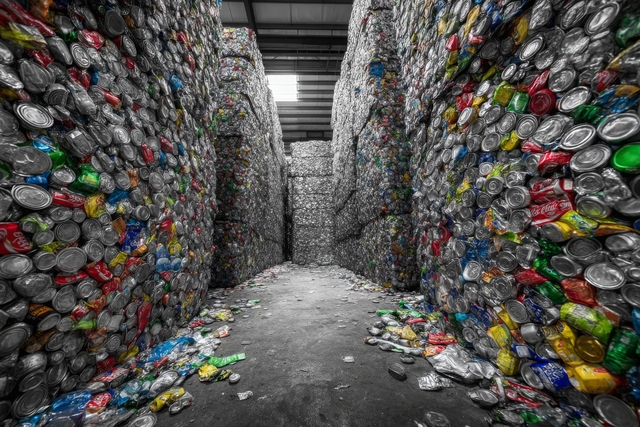
Australia has long relied on international markets to handle part of its recyclable materials, and Canberra is no exception. In recent years, more than 100,000 tonnes of recycling from Canberra has been exported overseas each year. While this practice has kept the local system moving, questions about sustainability, transparency, and the impact on waste services Canberra are now at the forefront.
In this article, we will explore the issue of recycling export Canberra, what it means for households and businesses, how it impacts local Canberra waste management, and why understanding the flow of recycling is important for everyone who uses skip bins or council services.
Why Does Recycling Export Canberra Still Happen?
Recycling exports are tied to both economics and infrastructure. Canberra produces a significant amount of recyclable material each year, from paper and cardboard to plastics, glass, and metals. Local facilities can process some of this, but not all.
Much of Canberra’s recycling is sorted locally and then sent to international buyers who turn it into new products. For example:
- Cardboard and paper are often exported to countries with large-scale paper mills.
- Plastics are sometimes shipped to facilities that specialise in turning them into reusable pellets.
- Scrap metals have strong export demand in Asia.
The global recycling market creates both opportunity and risk. When international demand is strong, Canberra recycling flows smoothly. But when countries tighten import restrictions or global prices crash, stockpiles can grow, and the system struggles.
The Risks of exporting recyclable material
While exporting recyclable material helps reduce landfill pressure, it comes with several challenges:
- Lack of transparency – Once materials leave Australia, it becomes difficult to track whether they are truly recycled or dumped elsewhere.
- Environmental costs – Shipping large volumes overseas adds emissions and transport impacts.
- Market instability – Canberra waste management services depend on international buyers, meaning local recycling programs can be disrupted when global markets change.
- Public confidence – Many residents wonder if their careful recycling efforts actually make a difference.
This uncertainty is why governments, councils, and private waste services Canberra are now under pressure to develop stronger domestic recycling solutions.
How Does This Affect Canberra Waste Management?
The ACT Government has clear waste reduction goals, including a long-term target of achieving a zero waste city. Yet the reliance on recycling exports shows the system still has gaps.
When local recycling facilities cannot process certain types of waste, exporting becomes the short-term fix. But this means:
- Council programs must adapt quickly to changes in global demand.
- Waste services Canberra, including skip bin providers, need to explain to customers what happens to their recycling.
- Residents are encouraged to be more careful with sorting waste at the source, to reduce contamination and increase the value of exported recycling.
The issue highlights a bigger question: Should Canberra invest more in local recycling plants, even if it costs more in the short term, to reduce reliance on export markets?
Recycling Canberra and the Role of Skip Bins
Skip bins play a surprisingly important role in Canberra’s recycling journey. Whether for households, renovations, or commercial projects, skip bins collect large volumes of waste that can often be recycled if sorted correctly.
Providers of skip bins in Canberra are increasingly offering:
- Dedicated recycling skip bins for materials like green waste, metals, and concrete.
- Education for customers about what can and cannot be placed in bins.
- Partnerships with recycling facilities to ensure as much material as possible is recovered locally before export.
This shows how everyday residents and businesses directly connect with broader issues like recycling export Canberra. Choosing the right skip bin service can make a difference in keeping more waste out of landfill and supporting the recycling chain.
Green Waste and Recycling Export Canberra
Not all recyclable material is exported. Green waste, for example, is processed locally into mulch and compost. This highlights that some parts of Canberra’s recycling system are more self-reliant.
However, the contrast between locally processed green waste and exported plastics or paper raises awareness of the uneven system. It also shows why waste services Canberra must be transparent with residents about where different materials go after collection.
What Residents Can Do to Improve Recycling Canberra
Even though international markets still handle much of Canberra’s recycling, residents can play an active role in making the system more effective:
- Follow local guidelines – Reduce contamination in recycling bins by only placing approved items.
- Use skip bins responsibly – When hiring skip bins, separate recyclables like metals, bricks, and green waste.
- Support local waste services Canberra – Choose providers that are clear about recycling practices.
- Reduce waste at the source – Buy products with less packaging and choose reusable items where possible.
Each action improves the quality of materials collected and increases the likelihood that recycling is processed effectively, whether locally or overseas.
Government and Industry Response to Recycling Export Canberra
The ACT Government has acknowledged the risks of relying on exports. Investments are being considered in new facilities to process plastics and paper domestically. At the same time, the national ban on exporting certain waste streams, such as unprocessed plastics and mixed paper, is pushing Canberra to rethink its recycling pathways.
Waste companies are also adapting by:
- Installing better sorting technology.
- Partnering with manufacturers to use recycled materials locally.
- Offering transparent reporting to build public trust.
The more Canberra can reduce reliance on recycling export, the stronger and more resilient its local waste management system will become.
Why Recycling Export Canberra Matters for the Future
Recycling is no longer just about putting the right item in the right bin. It is about building a system that is sustainable, transparent, and capable of withstanding global market shifts.
The fact that over 100,000 tonnes of Canberra recycling still goes overseas shows there is more work to do. Exporting may remain part of the solution in the short term, but long-term progress will require:
- Stronger domestic recycling plants.
- Continued government investment.
- Active participation from residents and businesses.
For households and businesses using skip bins, this means being mindful about what goes into the bin and choosing waste services Canberra that commit to genuine recycling.
You Might Be Like To read About : Bin Shaming in Canberra: How Skip Bins Help the Community
Conclusion
The issue of recycling export Canberra shines a light on the challenges of modern waste management. While exporting recyclable material has kept the system moving, it raises concerns about transparency, environmental costs, and long-term sustainability.
For residents and businesses, the key takeaway is that waste choices matter. Sorting correctly, using skip bins responsibly, and supporting local waste services Canberra all contribute to a stronger recycling system.
If Canberra can reduce its reliance on exports and invest in local processing, it will not only build a more resilient system but also strengthen public confidence in recycling Canberra for years to come.

